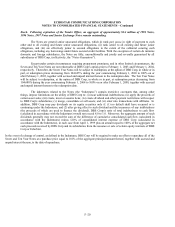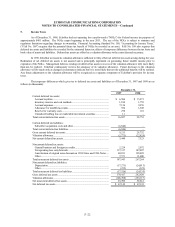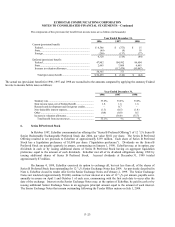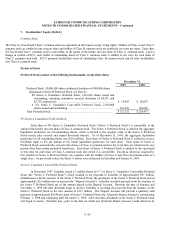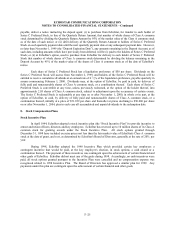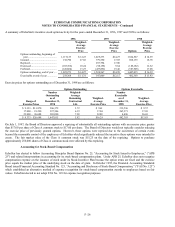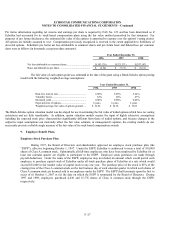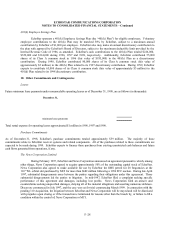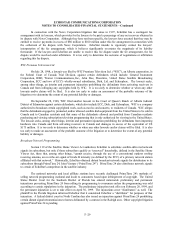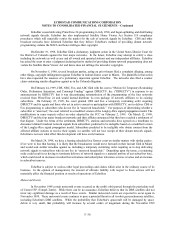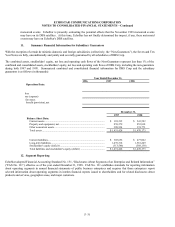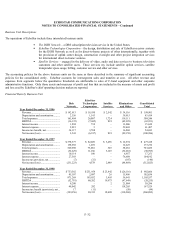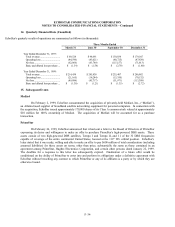Dish Network 1998 Annual Report Download - page 77
Download and view the complete annual report
Please find page 77 of the 1998 Dish Network annual report below. You can navigate through the pages in the report by either clicking on the pages listed below, or by using the keyword search tool below to find specific information within the annual report.ECHOSTAR COMMUNICATIONS CORPORATION
NOTES TO CONSOLIDATED FINANCIAL STATEMENTS – Continued
F–30
EchoStar ceased delivering PrimeTime 24 programming in July 1998, and began uplinking and distributing
network signals directly. EchoStar has also implemented Satellite Home Viewer Act Section 119 compliance
procedures which will materially restrict the market for the sale of network signals by EchoStar. CBS and other
broadcast networks have informed EchoStar that they believe EchoStar’s method of providing distant network
programming violates the SHVA and hence infringes their copyright.
On October 19, 1998, EchoStar filed a declaratory judgment action in the United States District Court for
the District of Colorado against the four major networks. In the future, EchoStar may attempt to certify a class
including the networks as well as any and all owned and operated stations and any independent affiliates. EchoStar
has asked the court to enter a judgment declaring that its method of providing distant network programming does not
violate the Satellite Home Viewer Act and hence does not infringe the networks’ copyrights.
On November 5, 1998, several broadcast parties, acting on prior threats filed a complaint alleging, among
other things, copyright infringement against EchoStar in federal district court in Miami. The plaintiffs in that action
have also requested the issuance of a preliminary injunction against EchoStar. The networks also filed a counter
claim containing similar allegations against us in the Colorado litigation.
On February 24, 1999, CBS, NBC, Fox, and ABC filed with the court a “Motion for Temporary Restraining
Order, Preliminary Injunction, and Contempt Finding” against DIRECTV, Inc. (“DIRECTV”) in response to an
announcement by DIRECTV that it was discontinuing retransmission of the programming of the four networks
received from PrimeTime 24 and would instead distribute its own package of network affiliates to its existing
subscribers. On February 25, 1999, the court granted CBS and Fox a temporary restraining order requiring
DIRECTV and its agents and those who act in active concert or participation with DIRECTV, not to deliver CBS or
Fox programming to subscribers who do not live in “unserved households.” For purposes of determining whether a
subscriber is “unserved,” the court referred to a modified version of the Longley-Rice signal propagation model. The
modifications in some respects reflect an order adopted by the FCC on February 2, 1999. On March 12, 1999,
DIRECTV and the four major broadcast networks and their affilates announced that they have reached a settlement of
that dispute. Under the terms of the settlement, DIRECTV, stations and networks have agreed on a timeframe to
disconnect distant broadcast network signals from subscribers predicted to be ineligible based on a modified version
of the Longley-Rice signal propagation model. Subscribers predicted to be ineligible who obtain consent from the
affected affiliate stations to receive their signals via satellite will not lose receipt of their distant network signals.
EchoStar is not sure what effect this development will have on its business.
On March 24, 1999, we have a hearing scheduled in a Denver court on similar matters with similar parties.
If we were to lose that hearing, it is likely that the broadcasters would move forward on their lawsuit filed in Miami
and would seek similar remedies against us, including a temporary restraining order requiring us to stop delivering
network signals to subscribers who do not live in “unserved households.” Depending upon the terms, a restraining
order could result in us having to terminate delivery of network signals to a material portion of our subscriber base,
which could result in decreases in subscriber activations and subscription television services revenue and an increase
in subscriber turnover.
EchoStar is subject to various other legal proceedings and claims which arise in the ordinary course of its
business. In the opinion of management, the amount of ultimate liability with respect to those actions will not
materially affect the financial position or results of operations of EchoStar.
Meteoroid Events
In November 1998 certain meteoroid events occurred as the earth’s orbit passed through the particulate trail
of Comet 55P (Tempel-Tuttle). While there can be no assurance, EchoStar believes that its DBS satellites did not
incur any significant damage as a result of these events. Similar meteoroid events are expected to occur again in
November 1999. These meteoroid events continue to pose a potential threat to all in-orbit geosynchronous satellites,
including EchoStar’s DBS satellites. While the probability that EchoStar’s spacecraft will be damaged by space
debris is very small, that probability will increase by several orders of magnitude during the November 1999


